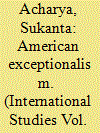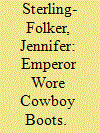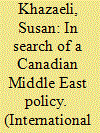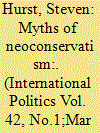| Srl | Item |
| 1 |
ID:
069355


|
|
|
| 2 |
ID:
084675


|
|
|
|
|
| Publication |
2008.
|
| Summary/Abstract |
Why does it matter if the United States is an empire in any objectively definable sense? All this academic and political pundit hand-wringing, over whether the United States should technically be labeled an empire or not, seems oddly out of step with the sorts of egregious foreign policy behaviors the United States engages in on a daily basis. Yet the words we use to describe something do matter a great deal to what we see and how we act in the world. In this paper, I argue that the closer one looks at the debate over the empire designation, the more one begins to see an underlying dynamic of political self-delusion that is endemic to the American power project. America wields enormous power that affects the daily lives of people around the globe, but like a schoolchild on the playground it does not like to be called names. The extent to which political observers participate in this obfuscation is an interesting topic in its own right, as it underscores how name-calling is a political act in itself.
|
|
|
|
|
|
|
|
|
|
|
|
|
|
|
|
| 3 |
ID:
192886


|
|
|
|
|
| Summary/Abstract |
Public debate about Canada's role in the Middle East is divided between two camps. One camp contends that Canadian foreign policy should return to its Pearsonian roots, in which Canada plays the role of a dispassionate but honest broker. The other holds that Canada's foreign policy should be defined by high-minded principles. The disagreement is over norms, not interests. This paper refers to two former Prime Ministers who roughly embody the two schools of thought on Canada's foreign and defense policy in the Middle East: Lester B. Pearson and Stephen Harper. Contrary to conventional wisdom that Harper was a realist and Pearson, a Pearsonian, the paper demonstrates that Pearson pursued a realist foreign policy that advances Canada's national security interests whereas Harper was guided by a values-based neo-conservative ideology.
|
|
|
|
|
|
|
|
|
|
|
|
|
|
|
|
| 4 |
ID:
061566


|
|
|
|
|
| Publication |
Mar 2005.
|
| Summary/Abstract |
The objective of this article is to refute the popular and influential view that neoconservatism is the driving force behind US foreign policy under George W. Bush. In fact, neoconservatism ¾ properly understood ¾ has been a marginal influence on a foreign policy, which has been characterized primarily by a different kind of conservative ideology. In order to demonstrate this, the article firstly seeks clearly to define contemporary neoconservatism in the foreign policy context; it then goes on to examine the Bush foreign policy and its key elements. What all this reveals is that US policy has been more driven by nationalist impulses than neoconservative ones. Indeed, those like Stefan Halper and Jonathan Clarke who argue that neoconservatism has been the key component shaping the Bush outlook, not only exaggerate the influence of one particular ideology but underestimate the importance of other key factors determining American policy since 2001.
|
|
|
|
|
|
|
|
|
|
|
|
|
|
|
|